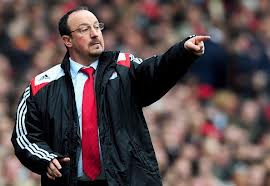
Liverpool in the Premier League Era: Part Sixteen
By TTT Subscriber Anthony Stanley.
The autumn and winter months of 2010 will never be remembered fondly by any Liverpool fans. Indeed, and certainly since the formation of the Premier League, there was probably never a more depressing time to call yourself a Red; even the frustration and relative fallowness of the Souness years paled in comparison with those dark months. Atypically for the terraces of Anfield – mobilised further, if not in unity, then certainly in a common cause of hatred for the owners of the club – by October the new Liverpool manager was being castigated mercilessly as he haplessly rubbed his face and made vainglorious excuses. Results on the pitch plummeted to new lows while affairs away from the actual football were equally depressing as the football club’s very existence was briefly threatened.
Rafa Benitez, despite retaining a hugely loyal cadre of fans, was also a divisive figure in the terraces by the summer of 2010 and had lost the support of two of the most influential members of the playing squad. With the toxic friction that was the Spaniard’s relationship with an increasingly convoluted board room, and following a disappointing campaign that has seen the Reds finish seventh in the Premier League, Benitez was never going to survive the chop. On June 3rd Liverpool announced that he would leave the club ‘by mutual consent’. Recently appointed chairman, Martin Broughton, who would now be tasked with finding a replacement as his bosses sought to sell the club, said:
‘Rafa will forever be part of Liverpool folklore after bringing home the Champions League following the epic final in Istanbul but after a disappointing season both parties felt a fresh start would be best for all concerned’.

This less than ebullient and effusive epitaph was emblematic of the corrosively erroneous view of Benitez that was held by many within the media and, evidently, those within the corridors of power at Anfield. He had taken a club on its knees and made them the most feared side in Europe within the space of a few years. Dion Fanning, writing in the Independent, prophetically declared that Liverpool supporters would look back at the Spaniard’s tenure as a golden age and, even though there was a deeply fractured fan base during his reign, few Reds with even a smattering of footballing knowledge would now dispute this prescient prediction.
Broughton’s choice to fill Benitez’s shoes was the cliched steady hands of a much travelled but respected English coach, Roy Hodgson, who had garnered much domestic respect by improbably getting his Fulham side to the UEFA Cup final, where they had been beaten by Atletico Madrid. It was enough to secure him an LMA manager of the year award and a catastrophically myopic move to Liverpool. Hindsight may well be a boon to all football experts, but the infinitely pragmatic Hodgson’s success had been built on uninspiring football and securing survival. Fine for the likes of the Cottagers, but expectations at Liverpool are on a wholly different level. Sure, he had won titles in the relative footballing backwater of Scandinavia but, even here, his methods had been more about grinding than decisive football. When he had been given big jobs – Internazionale of Milan and a then-still-flush Blackburn Rovers – the results had been borderline disastrous.
 And so it would prove at Liverpool. Joe Cole, on the face of it the new manager’s first signing, but a transfer that had the grubby fingerprints of managing director Christian Parslow all over it, was joined by Paul Konchesky and and Christian Poulsen in a troika to rival the summer of 2002’s horrendous transfer dealings. Brad Jones and Raul Meireles were also recruited; the former would still be conning a wage at the club six years later while the latter was one of Hodgson’s better signings but still barely lasted a year. To make matters worse – and in fairness to the new manager, this was hardly his fault – Mascherano effectively downed tools and went on strike after Barcelona started casting flirtatious looks in his direction. By 30th August he would sign for the Catalans, robbing Hodgson of one of the best defensive midfielders in the game. But then, the woefully one-paced and insipid Poulsen was hardly a replacement in the Reds’ engine room.
And so it would prove at Liverpool. Joe Cole, on the face of it the new manager’s first signing, but a transfer that had the grubby fingerprints of managing director Christian Parslow all over it, was joined by Paul Konchesky and and Christian Poulsen in a troika to rival the summer of 2002’s horrendous transfer dealings. Brad Jones and Raul Meireles were also recruited; the former would still be conning a wage at the club six years later while the latter was one of Hodgson’s better signings but still barely lasted a year. To make matters worse – and in fairness to the new manager, this was hardly his fault – Mascherano effectively downed tools and went on strike after Barcelona started casting flirtatious looks in his direction. By 30th August he would sign for the Catalans, robbing Hodgson of one of the best defensive midfielders in the game. But then, the woefully one-paced and insipid Poulsen was hardly a replacement in the Reds’ engine room.
The rest of this article is for Subscribers only.
[ttt-subscribe-article]